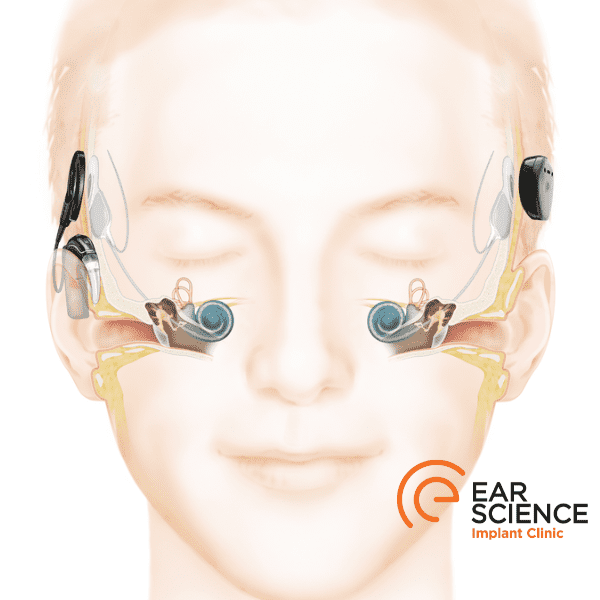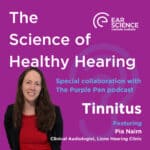
Tinnitus
Tinnitus affects a sizeable percentage of the population. The Busselton Healthy Ageing Study has shown that approximately 23% of Baby Boomers (50 and 70 years of age) have tinnitus, and about 9% of these report that it affects their daily life ‘Frequently’ or ‘All the time’. A further 32.4% report that it affects their daily life ‘Occasionally’ (Stegeman, 2021).
There are only a few proven treatments for tinnitus. Hearing aids have been shown to be the most effective, especially when hearing aids are optimally fitted (Waechter, 2022). Cognitive behaviour therapy is also a treatment that has been shown to be effective (Baguley, 2013).
Cochlear Implants
Cochlear implants have also been shown to reduce the severity of tinnitus. Ear Science researchers have shown that about half of those who receive an implant had pre-existing tinnitus.
At Ear Science, we have implanted over 1200 people with cochlear implants, some in one ear, some in both ears. All of them have provided information about their tinnitus, both before and after surgery, which has enabled the analysis of the effects of implantation on tinnitus.
In a study of 210 implant recipients that Ear Science researchers published in 2020, 49% of implant recipients reported having tinnitus before surgery, and 39.5% reported having it 24 months after surgery. The average level of distress associated with tinnitus went from a score of 30 (out of 104 using the Tinnitus Reaction Questionnaire (TRQ)) to a score of 5. We also found that the hearing-related quality of life significantly improved after implantation and that this improvement was associated with a decrease in tinnitus (Opperman, 2021).
A more subsequent study of implant recipients implanted at Ear Science Implant Clinic (Assouly, 2022) examined levels of tinnitus distress in 300 recipients. In this sample, 56% reported tinnitus before implantation, which was reduced to 47% 12 to 24 months after implantation. Almost everyone who had tinnitus before surgery reported that the level of distress was lower after receiving the implant. The average tinnitus distress score went from 12 to 3 (out of 104, using the TRQ). Tinnitus was not a major problem: 80% had no or slight tinnitus before surgery, which improved to 87% after implantation. However, a small number of implant recipients reported onset or increased tinnitus distress following implantation. Tinnitus arising after implantation has also been reported by others (Baguley, 2013).
Cochlear Implantation to treat tinnitus rather than hearing loss
There have been a few reports of implantation of people with a primary problem of tinnitus for those who have normal hearing in one ear but with severe to profound hearing loss in the other ear (single-sided deafness) (Assouly, 2021). Any residual hearing that is lost is not so much of a problem because the other ear still functions normally. These small number of studies all showed a significant reduction in tinnitus. However, the level of evidence is low (small number of participants in studies, and they did not include a control group).
This is something that needs more research with properly designed and conducted clinical trials.
In conclusion, cochlear implants are likely to decrease tinnitus distress. However, there is a small chance that tinnitus may be newly reported or increase in severity. This is something that should be discussed with your audiologist and surgeon. However, at this stage, there is not a compelling case for cochlear implants to be provided to those whose primary problem is tinnitus.
References
Assouly KKS, van Heteren JAA, Stokroos RJ, Stegeman I, Smit AL. Cochlear implantation for patients with tinnitus – A systematic review. Progress in Brain Research. 260:27-50; 2021. 10.1016/bs.pbr.2020.06.013
Assouly K, Smit AL, Eikelboom RH, Sucher C, Atlas MD, Stokroos R, Stegeman I. Analysis of a cochlear implant database: changes in tinnitus distress after cochlear implantation. Trends in Hearing. 26; 2022. 10.1177/23312165221128431
Baguley D, McFerran D, Hall D. Tinnitus. The Lancet. 382(9904):1600-1607; 2013. 10.1016/S0140-6736(13)60142-7t
Baguley DM, Atlas MD. Cochlear implants and tinnitus. Progress in Brain Research. 2007;166:347-55.
Opperman E, le Roux TE, Masenge A, Eikelboom RH. The effect of tinnitus on health-related quality of life outcomes in adult cochlear implant recipients. International Journal of Audiology. 60:246-254; 2021. 10.1080/14992027.2020.1828633
Stegeman I, Eikelboom R, Smit A, Bucks R, Baguley D, Stokroos R, Bennett B, Tegg-Quinn S, Hunter M, Atlas M. Tinnitus and its associations with general health, mental health and hearing loss in a population study. In: Tinnitus-An Interdisciplinary Approach Towards Individualized Treatment: Towards Understanding the Complexity of Tinnitus. Elsevier. pp.431-450; 2021.
Waechter S, Jönsson A. Hearing aids mitigate tinnitus, but does it matter if the patient receives amplification in accordance with their hearing impairment or not? A meta-analysis. American Journal of Audiology. 31(3)789-818; 2022. 10.1044/2022_AJA-22-00004
The Largest Cochlear Implant Clinic in Perth
Thousands of Australians could benefit hugely from a hearing implant. Can you believe that only a little more than 8% of those that need a cochlear implant will get one?
At Ear Science Implant Clinic, we are committed to increasing this number and providing hearing implants to individuals all over WA. With 4 locations, we are the most extensive private hearing implant clinic in Western Australia. With a highly-skilled team of audiologists in Perth working alongside experienced fellowship-trained surgeons, our team cares for over 1,400 hearing implant recipients.






